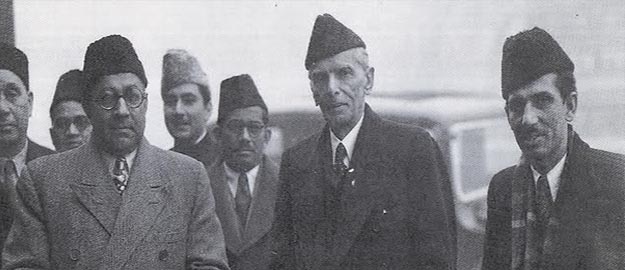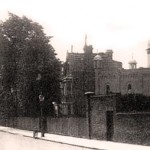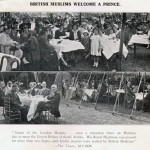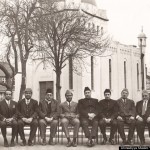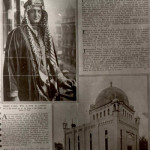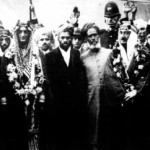The history behind Jinnah’s return to Indian politics in 1934 makes for an inconvenient truth. The man whose eloquent persuasion left Jinnah no escape in returning to politics, has been forgotten in the annals of official Pakistani history. That man was not Liaqat Ali Khan and certainly not Dr. Muhammad Iqbal but Abdur Rahim Dard – an Ahmadi missionary in London.
August 14, Pakistan Independence Day, is a date of great significance for Pakistanis everywhere but it has a particular resonance for Matiallah Dard, vice-chairman of Bexley Multi-Faith Forum and Thamesmead Inter-Faith Forum.
Imam of London Mosque Abdur Rahim Dard
It was Mr Dard’s uncle, Maulana Abdur Rahmin Dard, who persuaded Mohammed Ali Jinnah, the founder and first leader of Pakistan, to leave London to go and further the cause of Muslims back home in India.
Jinnah, himself a Muslim, had been involved in politics in India and was particularly concerned about the situation of Muslims in the predominantly Hindu country.
In 1928, after studying the constitutional plan devised by a committee of the All India Congress Party, the Second Khalifa of Ahmadiyya Muslim Community highlighted the dangers this plan could mean for Muslims in a book entitled “Muslim Rights And The Nehru Plan”.
Maulana Mohammad Ali Jouhar, paid tribute to the work of the Ahmaddiyya Movement in fighting for an independent Muslim state in India with these words,
“It will be ungrateful if we do not mention (the Second Khalifa) and his well- disciplined Community who have devoted all their efforts, irrespective of doctrinal differences, towards the welfare of the Muslims. These gentlemen are, on the one hand, taking an active interest in the politics of Muslims and, on the other, energetically engaged in promoting the unity, organisation, trade and preaching among Muslims.
“The time is not far away when the attitude of this organised sect of Islam will provide guidance for the Muslim nation in general and for those persons in particular who are idly sitting under the domes of Bismillah and making boastful and empty claims of service to Islam..”
In the early 1930s, having despaired of any progress being made in getting Hindus & Muslims to live together peacefully, Jinnah left India and worked as a barrister in London.
At the time, Mr Dard’s uncle, who died in 1955, was Imam at the London Mosque in Southfields and he had been instructed by the spiritual leader of the Ahmadiyya Muslims, Hadhrat Khalifatul Masih II Mirza Bashiruddin Mahmud, to persuade Jinnah to return home to take part in politics again.
Imam Dard and Jinnah became good friends and met regularly to talk about the situation in India but it was difficult to convince him.
Mr Dard, 74, said: “Jinnah was very stern man. Even Lord Mountbatten said he was a difficult man to deal with.
“He was really obstinate. He did not change his mind easily. “My uncle told me about the whole incident.
He said he asked Mr Jinnah many times why he was living in London and why he quit politics.”
Then one day the Imam made a remark that finally hit home with the politician.
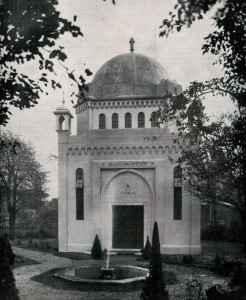
Mr Dard said: “My uncle suggested that if he did not go back to India he would be a traitor to the Muslim cause. That affected him very much. “He was stunned and remained silent for a while. Then he asked my uncle what he should do.
To symbolize Jinnah’s return to politics, Dard arranged for a lecture on the future of India at the “London Mosque” in Putney London in April 1933 where Jinnah acknowledged the Imam’s role in his decision to return to political life, saying:
“The eloquent persuasion of the Imam left me no escape.” The Sunday Times, London, 9th April 1933.
Jinnah returned to India in 1934 and became Governor General of Pakistan when it became an independent state on August 14, 1947.
Prominent Muslim figures that have attended the London Mosque include Sir Allama Muhammad Iqbal, Prince Faisal of Saudi Arabia, Sir Feroz Khan Noon, Maulana Mohammad Ali Jauhar, Muhammad Shafi (renowned Muslim Journalist), The Agha Khan, Muhammad Zafrulla Khan and A.K. Fazlul Huq.
Mr Dard said: “I am very happy and proud that I am related to the man who sent Jinnah back to make something of Pakistan.
“If he had not gone back, there would have been no Pakistan.”

